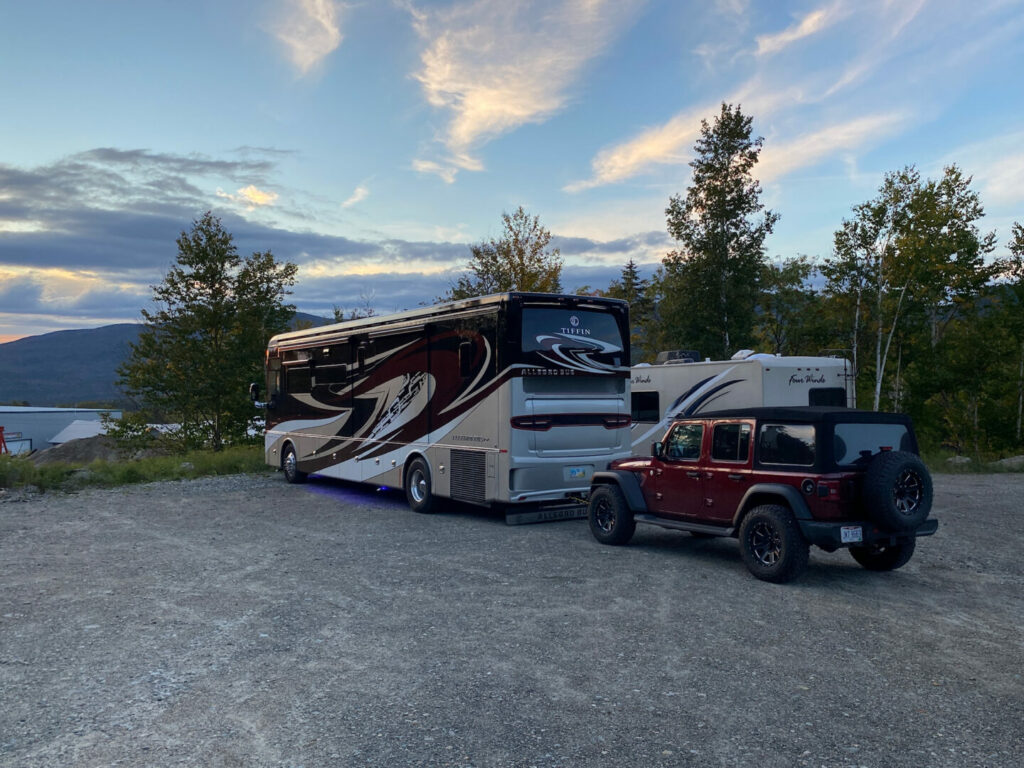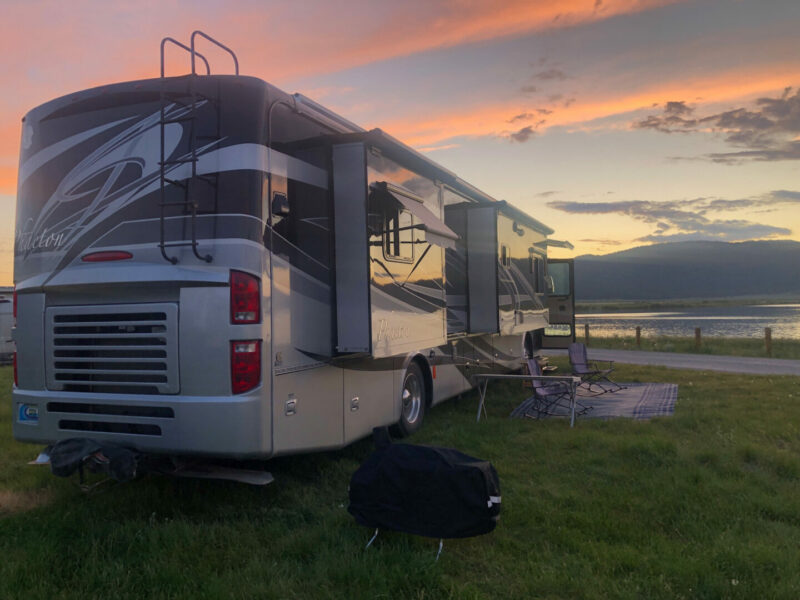Table of Contents Show
If a camping trip is all about the destination, why did they invent the diesel pusher? These sturdy yet elegant motorcoaches have almost every amenity, with the horsepower of a Triple Crown thoroughbred.
They must be for RVers who wish to revel in the journey, enjoying the luxury as they travel.
With the air-ride suspension, air brakes, and enough towing power to bring along a mother-in-law apartment, it’s no wonder travel lovers are pulling out all the stops to snatch their diesel pushers.
What Is a Diesel Pusher?
Any diesel Class A motorhome can be a diesel pusher. They are usually easy to spot, with a bus-like front end, some of the largest windshields in the industry, and a diesel engine in the back.
Most fall between 35’ to 45’ in length, and all come with top-of-the-line amenities. There is sleeping space for two to eight people, and many diesel pushers have more than one bath onboard.
You would brake in one of these rigs with air brakes, and they usually have an air-ride suspension for smooth travel.
Diesel pushers can tow heavier loads and typically get better gas mileage than a comparable gas-driven RV.

Why Do They Call Them Diesel Pushers?
Diesel pusher motorhomes have their engines in the back of the vehicle. They will have more torque than their gas-fueled counterparts, so there’s plenty of power to ‘push’ the bus up inclines and tow weightier vehicles behind them.
This is in contrast to other gas motorhomes where the engine is in the front and it appears like it is pulling the vehicle.
Pro Tip: If you’re looking for the best Class A Motorhomes, these are the best options in 2022!
The Benefits Of a Diesel Pusher
A diesel engine has more torque, which translates into more horsepower to move the RV and more power to tow heavier loads.
It usually gets better gas mileage than gasoline engines, and a diesel engine might last twice as long.
The ride in a diesel pusher is more comfortable and smooth, mainly because of the air-ride suspension.
These RVs are also easier to control, and although the engine might be a bit loud, it is at the rear of the vehicle.
Gas-powered buses with an engine at the front can be extremely noisy in the cab. They also let a little more heat into the RV when the engine is working hard and it’s right where you are sitting.
The diesel engine does not require a high-voltage electronic ignition, making them dependable for long periods.

The Disadvantages Of a Diesel Pusher
Maintenance and repairs on diesel pushers are usually more expensive than their gasoline counterparts, and some diesel engines have a hard time starting in severely cold weather.
The cost of the vehicles can be much higher than a gasoline Class A of comparable length.
Many diesel pushers are between $300,000 and $2,500,000. Finding a mechanic to work on diesel RVs can be a bit challenging.
It might not be easy to have maintenance or repairs done quickly, as there are fewer diesel mechanics.
How Long Will a Diesel RV Last?
Most diesel engines will live twice as long as gas engines. Some of this has to do with the combustion needed to power each.
The diesel engine depends on ignition occurring when the air in the combustion chamber compresses, and then diesel fuel is injected for ignition.
A gasoline engine uses a spark for the ignition.
If serviced and maintained regularly, it is not uncommon for diesel engines to last up to 300,000 miles.

Is a Diesel Pusher Better Than Gas?
There are several features in a diesel pusher that make it the obvious choice in a Class A motorhome.
Most diesel engines will get better gas mileage and last longer than a gasoline engine on a rig of the same size.
These engines can tow more weight and carry a heavy coach up and down hills more efficiently than a gas engine.
The ride in a diesel pusher is usually much smoother than its counterpart.
For all this comfort and dependability, you will pay more on the sticker price.
But your investment will no doubt last longer and have a higher trade-in value, as well.
Keep in Mind: Is a Diesel shortage coming? Read this to see if you should expect a Diesel shortage in 2022!
What Is the Smallest Diesel Pusher?
Currently, the smallest diesel pusher is from Tiffin. The Breeze is 33’ long but packs in all the luxury and high-end amenities in larger Class As.
With two floorplans, this motorcoach hits its marks on drivability, comfort, and spaciousness.
It won’t break the bank, as the price is on the lower end of the popular diesel pushers, at $230,000.
Diesel Pushers: A Classic RV
For classic style, form and comfort, a diesel pusher can’t lose. Add their stability, long-lasting reliability, and strength, and you won’t find a better option in a large Class A motorhome.
If you want an RV that can handle anything the highway can throw at you, it’s time to consider upgrading to a diesel pusher. You won’t be sorry!
Have you traveled in a diesel pusher before?






